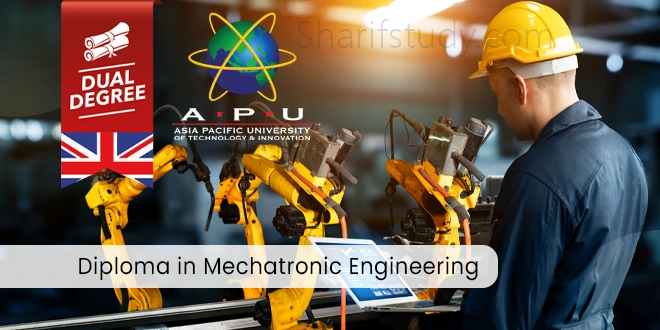APU Diploma in Mechatronic Engineering is a branch of engineering that focuses on the design, producing, and repair of devices that have both mechanical and electrical components. Engineer Tetsuro Mori created the term in 1969 to describe the synergy that exists between electrical control systems and the mechanical equipment they manage. Since then, the term’s definition has expanded to cover the integration of numerous other disciplines, such as computer engineering, systems engineering, and programming.
While gaining proficiency in Mechatronic that attracts interest they will develop their engineering skills. This consists of the most recent advances in research in fields such as energy harvesting, sensors, and mechatronics in healthcare. Students will be working in fully equipped electronics labs as well as an advanced computer lab.
Program Outline
APU Diploma in Mechatronic Engineering is specifically designed to teach students :
- Knowledge, abilities, and features that enable them to build a wide understanding of well-defined engineering difficulties in accordance with the Dublin Accord.
- The curriculum includes industrial training in order to prepare an upcoming generation of young people desiring to become engineers.
- Soft skills such as communication, teamwork, and life-long learning are offered as they are relevant to the resolution of difficulties experienced today and in the future.
- Students with academic and professional skills to design solutions in mechatronics engineering that require a holistic yet unique perspective.
- Students will be able to smoothly proceed into degrees recognized by the Washington Accord in relevant fields, as well as a Masters in Engineering from the United Kingdom.
Semester 1
Students will learn Instruments in the first semester, with a focus on control methods using sensory technology. The Circuit Analysis section uses Kirchhoff’s law, network theorems, and nodal and mesh analysis to describe and calculate the current and voltage in each element of a network. In addition to product manufacture, they will learn about software based engineering plans.
Courses
- Instrumentation
- Fundamentals of Engineering Mathematics
- Circuit Analysis
- Engineering Drawing
Semester 2
Students continue their studies in APU Diploma Mechatronic Engineering from semester 1. The Analogue Electronics module is designed to teach students about analog devices and their analysis. Furthermore, Python improves the student’s programming knowledge.
Courses
- Engineering Mathematics 1
- Analogue Electronics
- Programming with Python
Semester 3
Students will continue their studies in Mathematics in semester 3. They would also understand the basic concepts of logic circuits and how they are utilized in digital systems. Number systems, Boolean algebra, and Karnaugh map techniques are also used to build simplified digital circuits, latches, flip flops, and basic asynchronous and synchronous counters.
Courses
- Engineering Mathematics 2
- Digital Electronics
Semester 4
Students begin learning about material science and robotics in semester 4. Material science is the application of basic chemistry and physics principles to understand the structure and properties of materials, which is critical for building systems. Robotics is the study of the design, construction, operation, and use of robots and computer systems for control, sensory feedback, and data processing. Students could use what they learned to build their own robots.
Courses
- Material Science
- Robotics
Semester 5
Two of the modules in semester 5 include the study of programming languages. Students are also taught about industrial management, safety, and ethics. Entrepreneurship module prepares students to create a mindset for thinking creatively employing innovation, recognizing possibilities, and generating business ideas.
Courses
- Industrial Management, Safety and Ethics
- Problem Solving and Program Design Using C
- Fundamentals of Entrepreneurship
Elective Courses 1
- Applied Mechanics
- Fundamental of Petroleum Engineering
Elective Courses 2
- Microprocessor Systems
- Petroleum Geochemistry
Semester 6
During the 6th semester, Mechatronics students analyze complex electronic, mechanical, or other engineering systems using CAD software. Coverage of fundamental thermodynamics, fluid mechanics, and heat transport is combined in the thermo-fluid course. These topics are essential for preserving high manufacturing process efficiency and for the design of goods or systems that followed.
Courses
- Computer-Aided Design & Manufacturing
- Thermo-Fluids
- Engineering Project
Elective Courses 3
- PLC and Pneumatics
- Elements of Reservoir Rock and Fluid
Elective Courses 4
- Systems and Control
- Petroleum Geology
Semester 7 – Internship (16 weeks)
Students must take part in an Internship/Industrial Training program for a minimum of 16 weeks. This program aims to provide a smooth transition for students from their educational environment to the formal workplace.
Additional Studies
After successfully completing this program and fulfilling the credit transfer requirements, students will be able to continue to Level 2 of the following APU degree programs.
- Bachelor of Engineering in Electrical & Electronic Engineering with Honors
- Bachelor of Computer Engineering with Honors
- Bachelor of Mechanical Engineering with Honors
- Bachelor of Engineering in Mechatronic Engineering with Honors
- Bachelor of Engineering in Petroleum Engineering with Honors
APU-DMU Dual Degree
Students enrolled in the Bachelor’s Degree Program are presented with the opportunity to join the APU-DMU Dual Degree Scheme. By choosing this pathway, upon graduation, students will be awarded two Degree Certificates & Transcripts: one from Asia Pacific University (APU) in Malaysia and another from De Montfort University (DMU) in the UK.
| Duration | Intakes |
| 2+ Years (7 Semesters) |
25 Apr 2024 | 04 Jul 2024 08 Aug 2024 | 19 Sep 2024 19 Nov 2024 |
Admission Requirements
| General Requirement | |
| SPM |
|
| IGCSE/O-LEVELS |
|
| UEC |
|
| STPM |
|
| CERTIFICATE |
|
English Requirements for International Students
- IELTS : 5.0
- TOEFL IBT : 40
- Pearson (PTE) : 47
- MUET : Band 3.5
Courses Fees
| Malaysian Students | International Students |
| RM 43,900 | RM 48,800 (USD 11,900) |
 SharifStudy Best way to Study in Malaysia
SharifStudy Best way to Study in Malaysia




